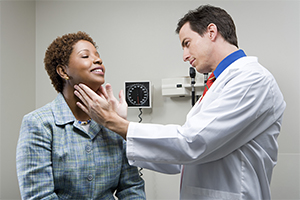
The thyroid is a small but powerful gland in the body that is responsible for almost all of the body’s hormone functions. The thyroid controls the hormones that affect your breathing, heart rate, body temperature and digestion. This butterfly-shaped gland is located at the base of the throat in the front of the neck.
Most of us don’t notice our thyroid unless something starts to go wrong. Because the thyroid controls so much of our hormone function, any disruption in its function or any abnormal function can wreak havoc on our bodies and immune systems. About 1 in 20 Americans have an underactive thyroid (hypothyroidism—the thyroid doesn’t release enough hormones) and about 1 in 100 Americans have an overactive thyroid (hyperthyroidism—the thyroid releases too many hormones.)
The thyroid can be affected by autoimmune disorders and cancer, and women and people over 60 are most at risk. Pregnant women can also suffer from thyroid problems during pregnancy and up to a year afterward.
Thyroids during pregnancy
Hormone changes during pregnancy are common and essential to maintaining pregnancy. The body goes through a lot of changes during pregnancy, and thyroid issues can complicate these changes. Diseases like Graves’ Disease can complicate fetal growth, cause preeclampsia and early labor. Thyroid issues during pregnancy need to be closely monitored by a doctor throughout every stage of pregnancy. Typically over the counter medications can control these thyroid levels throughout pregnancy.
Hyperthyroidism
Hyperthyroidism is over-activity of the thyroid. The thyroid makes too much of the hormones it is supposed to control, and causes an imbalance in the body’s systems. If there is too much thyroid hormone, every function of the body speeds up. Some of the symptoms of hyperthyroidism are:
• Irritability
• Nervousness
• Increased sweating and heart rate or heart racing
• Anxiety and difficulty sleeping
• High metabolism
• Being tired often
Symptoms may start slowly but over time lead to breakdowns of the body’s systems. The most common cause of hyperthyroidism is Graves’ Disease, a disease that is caused by antibodies in the blood that “turn” on the thyroid and cause overproduction. Graves’ Disease can run in families and occurs more often in women. Nodules or lumps in the thyroid can gradually grow and increase the thyroid’s activity, causing hyperthyroidism. Most of the time the thyroid is enlarged and visibly swollen, and patients have a rapid pulse. A blood test can also confirm levels of TSH (thyroid stimulating hormone) in the blood. Treating hyperthyroidism is highly dependent on the individual’s age and other medical conditions. Over the counter drugs may be prescribed to block the thyroid’s ability to make new hormones, and in some cases surgery is prescribed to remove the thyroid completely.
Hypothyroidism
Hypothyroidism is under-activity of the thyroid. The thyroid does not produce enough hormones to sustain body functions. Symptoms may be small at first, but over time untreated hypothyroidism can cause a number of health problems. Some symptoms of hypothyroidism are:
• Fatigue or tiredness
• Increased sensitivity to cold
• Dry skin and puffy face
• Weight gain
• Muscle weakness, muscles aches, muscle tenderness or stiffness
Hypothyroidism can cause systems in the body to move more slowly. Hypothyroidism in infants and children can cause delayed development, including delayed puberty, delayed dental development and poor growth. Severe cases can lead to physical and mental retardation.
Thyroid nodules and goiter
A thyroid nodule is an abnormal growth on the thyroid that is made up of cells but starts as a lump on the thyroid. Most nodules are noncancerous, but a small number do contain cancer cells. Most do not cause symptoms but instead are discovered on a routine physical exanimation or when patients notice changes in their neck. Nodules may cause hyperthyroidism, but most nodules are nonfunctioning. The biggest threat they pose is growing too large and interfering with breathing, swallowing or a feeling of fullness in the throat. Nodules are fairly common and usually appear on their own, but are sometimes caused by an iodine deficiency.
Iodine deficiency is a common cause of goiter, which is an abnormal enlargement of the thyroid gland. A goiter indicates there is a condition present which is causing the thyroid to grow abnormally. The thyroid concentrates iodine from the blood to make the thyroid hormone. If the blood does not have enough iodine, the gland cannot make enough of the hormone. The gland will signal the brain to send more TSH into the blood, which can cause a goiter growth in the thyroid. Goiters are not common in the United States, but are common in other areas of the world.
Thyroid cancer
Just like cells can grow together in the thyroid into nodules (noncancerous lumps,) thyroid cancer is another type of growth that can be dangerous. Malignant cancer cells form in the tissues of the thyroid gland and cause two types of cancer:
• Differentiated thyroid cancer includes well-defined tumors, poorly defined tumors and undifferentiated tumors. Well-defined tumors usually can be identified and treated easily, but poorly and undifferentiated tumors are harder to treat. They spread more quickly and have a poorer chance of recovery.
• Medullary thyroid cancer is a tumor that develops in C cells of the thyroid. C cells help maintain healthy levels of calcium in the blood.
Risk factors for thyroid cancer are:
• Being between 25 and 65 years old
• Being female
• Being exposed to radiation
• Having a history of an enlarged thyroid (goiter)
• Having a family history of thyroid disorders or disease
The thyroid is the great balancing act of the body’s function. Any changes in its efficiency or any disorders it develops may not only cause discomfort and pain, but lifelong damage to the body. Always develop a good relationship with your physician and attend annual physicals regularly to ensure that your thyroid is keeping you happy and healthy.
Disclaimer: The contents of this article, including text and images, are for informational purposes only and do not constitute a medical service. Always seek the advice of a physician or other qualified health professional for medical advice, diagnosis, and treatment.









Great article! The thyroid truly is a small but mighty gland that plays a crucial role in our overall health. I appreciated the clear explanation of how it regulates metabolism and impacts various bodily functions. This information is especially helpful for those of us who might be experiencing thyroid issues. Keep up the good work!
Reply